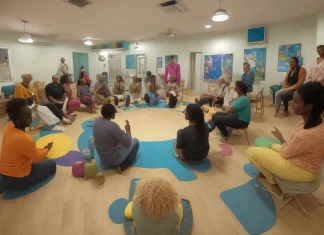Introduction to Occupational Therapy
Occupational therapy, a dynamic and compassionate healthcare profession, stands at the crossroads of healing and empowerment. This therapeutic approach focuses on enhancing individuals’ quality of life by enabling them to participate in meaningful activities, or “occupations,” that bring purpose and fulfillment. In this article, we delve into the world of occupational therapy, uncovering its principles, applications, techniques, and the transformative impact it has on countless lives.
Key Principles: Putting the Individual First

At the heart of occupational therapy lies the person-centered philosophy. Practitioners view each individual as a unique being with distinct needs, aspirations, and challenges. This holistic approach considers not only physical health but also emotional, mental, and social well-being. By understanding the whole person, therapists create tailored interventions that resonate with the individual’s identity and goals. Collaborative goal setting further empowers clients, fostering a sense of ownership over their therapeutic journey.
Navigating the Role of Occupational Therapists
Occupational therapists are skilled navigators of the human experience. They begin by conducting thorough assessments to grasp the client’s abilities, limitations, and personal circumstances. With this comprehensive understanding, therapists co-create treatment plans that integrate evidence-based interventions. These plans encompass a wide spectrum of activities and exercises aimed at restoring, improving, or adapting the client’s functional abilities. From relearning essential daily tasks to mastering advanced skills, occupational therapists serve as guides on the path to progress.
Versatility in Applications: From Pediatrics to Geriatrics
Occupational therapy’s versatility is showcased by its presence in diverse domains. For individuals recovering from injuries or surgeries, it plays a pivotal role in physical rehabilitation. Through tailored exercises and techniques, therapists aid the recovery of motor skills, strength, and coordination. Equally impactful is its contribution to mental health, where therapists employ creative strategies to alleviate anxiety, depression, and stress. In pediatrics, occupational therapy unlocks potential in children with developmental challenges, fostering independence and autonomy.
Crafting Independence: Techniques that Transform
The toolbox of occupational therapists is brimming with innovative techniques. Activities of daily living (ADL) training hones essential skills such as dressing, cooking, and grooming, promoting self-sufficiency. Assistive devices and technology open new avenues for those with mobility issues, granting access to a world of possibilities. Through adaptive strategies, therapists enable clients to circumvent obstacles creatively, proving that with determination, no challenge is insurmountable.
Empowering Lives: The Multifaceted Benefits

The ripple effect of occupational therapy is far-reaching. As clients regain their independence, they also cultivate self-confidence, transcending physical limitations. Social participation blossoms as therapy instills effective communication and interpersonal skills. The management of pain and stress becomes more manageable, enhancing overall well-being. Occupational therapy empowers individuals to script their narratives anew, embracing their roles as authors of their lives.
Dynamic Settings: Where Occupational Therapy Unfolds
Occupational therapy unfolds in a variety of settings, adapting its methods to suit diverse contexts. In hospitals and clinics, therapists collaborate with medical teams to expedite recovery and enhance post-operative outcomes. Educational institutions welcome occupational therapists who provide tailored support to students with special needs, fostering academic success. Community-based programs extend therapy’s reach, enriching the lives of those who may have limited access to traditional healthcare settings.
Challenges and the Moral Compass: Navigating Gray Areas
The journey of an occupational therapist isn’t without challenges. Striking the delicate balance between honoring client autonomy and ensuring their safety requires sound judgment and ethical consideration. Moreover, therapists must remain attuned to cultural nuances, respecting the diverse backgrounds and belief systems of their clients. By upholding high standards and ethical principles, occupational therapists navigate these complexities with compassion and integrity.
The Road Ahead: Envisioning the Future of Occupational Therapy
Occupational therapy stands on the brink of a dynamic future. The integration of technology holds promising potential, enabling therapists to engage clients in virtual environments and track progress remotely. As awareness of mental health grows, occupational therapy’s role in holistic wellness becomes even more pivotal. This evolution brings with it a surge in demand for qualified professionals, offering a myriad of opportunities for those aspiring to make a difference.
Becoming an Occupational Therapist: Pathways to a Rewarding Career
Embarking on a journey in occupational therapy necessitates the acquisition of knowledge and skills. Prospective therapists typically pursue bachelor’s or master’s degrees in the field. These programs equip them with the expertise needed to understand human development, anatomy, and therapeutic techniques. Upon completion, certification and licensing open the door to practice, allowing therapists to impact lives with their specialized knowledge.
Changing Lives: Testimonies of Transformation

Real stories mirror the profound impact of occupational therapy. One such success story follows the journey of Emily, a stroke survivor. Through intensive therapy, Emily relearned the intricacies of daily life. What seemed insurmountable transformed into achievable milestones. “Occupational therapy gave me my life back,” she shares. These narratives underscore the transformative power of occupational therapy, revealing how it rebuilds not only physical abilities but also the fabric of hope.
Evidence-Based Practice: Where Science and Care Converge
Occupational therapy remains rooted in research and evidence-based practice. Therapists diligently stay abreast of the latest studies, ensuring their interventions align with the most effective strategies. This commitment to research elevates the quality of care, maximizing outcomes and improving the lives of those they serve. Measurement tools and assessment techniques quantify progress, guiding therapists and clients along the path to success.
Collaborative Synergy: Teamwork in Healthcare
The collaborative spirit is the heartbeat of healthcare, and occupational therapists play a vital role within this ecosystem. Working hand-in-hand with physicians, nurses, and other healthcare professionals, they contribute unique insights that enrich treatment plans. Effective communication and coordinated efforts ensure seamless care, as each professional’s expertise converges to facilitate holistic healing.
Dispelling Myths: Separating Fact from Fiction
Myths shroud occupational therapy in misunderstanding. Contrary to misconceptions, this discipline isn’t limited to specific age groups or conditions. It transcends the boundaries of age, benefiting children, adults, and seniors alike. Occupational therapy isn’t solely confined to clinical settings; it extends to everyday life, equipping individuals with skills to conquer challenges and live life to the fullest.
In Conclusion: Empowering through Occupation
In the symphony of healthcare, occupational therapy plays a harmonious tune that resonates with purpose and empowerment. As individuals engage in occupations that define them, occupational therapists stand as mentors, guiding them towards newfound independence. Through collaboration, innovation, and the unwavering belief in human potential, occupational therapy transforms lives, turning hurdles into stepping stones on the path to a fulfilling existence.
FAQs: Unveiling the Insights
Q1: What qualifications are required to become an occupational therapist? To become an occupational therapist, one typically needs a bachelor’s or master’s degree in occupational therapy. After completing the program, certification and licensing are necessary to practice professionally.
Q2: How does occupational therapy benefit mental health? Occupational therapy employs various techniques to support mental health, including mindfulness, creative expression, and stress-reduction strategies. These interventions empower individuals to manage anxiety, depression, and other mental health challenges.
Q3: Can children with developmental delays benefit from occupational therapy? Absolutely. Occupational therapists specialize in pediatric care, helping children overcome developmental challenges and achieve important milestones. Through play-based interventions, they foster growth and independence.
Q4: What role does technology play in occupational therapy? Technology is an evolving tool in occupational therapy. Virtual reality, apps, and assistive devices enhance engagement and provide innovative ways to practice skills, making therapy more accessible and engaging.
Q5: How does occupational therapy contribute to elderly care? Occupational therapists work with the elderly to maintain their independence and enhance their quality of life. They address issues related to mobility, self-care, and home modifications to create safe and supportive environments for seniors.


























